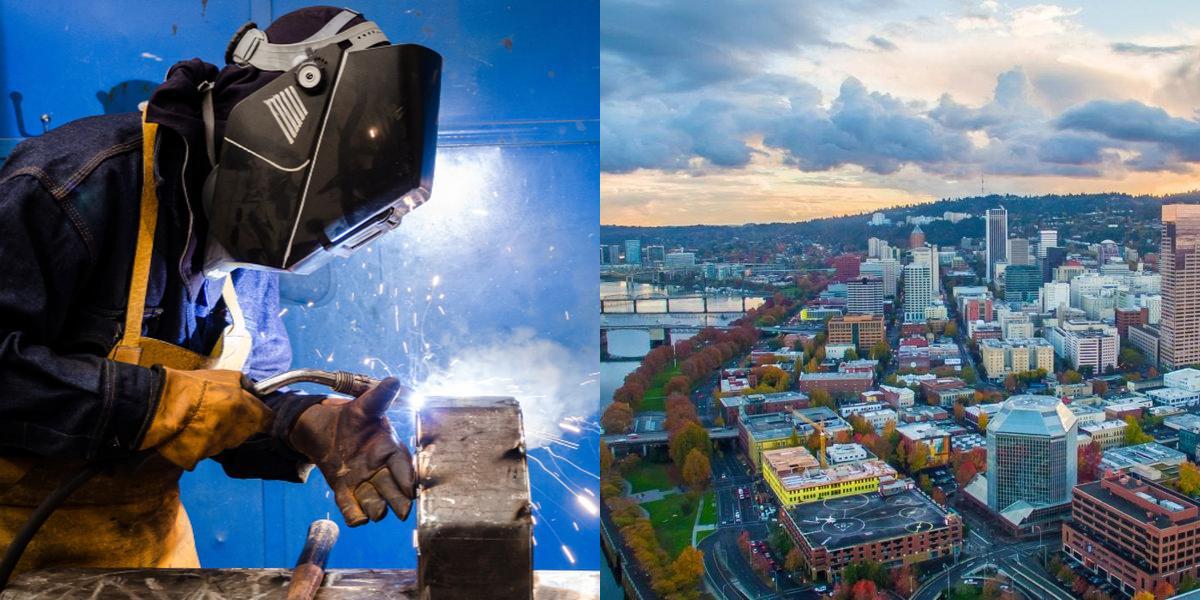How to Become a Welder in Oregon (2025)

A career as a welder in Oregon offers a direct path into a high-demand, skilled trade that forms the backbone of the state's manufacturing, construction, and shipbuilding industries. Unlike many other states, Oregon has a state-regulated certification system, ensuring high standards and competitive pay. With the national median salary for welders at $59,310 per year (BLS, May 2024), this hands-on career provides a secure future for those with the right skills.
How Long Does It Take to Become a Welder?
You can become a certified, job-ready welder in Oregon in as little as 6 to 12 months by completing a full-time certificate program. A 2-year associate's degree (A.A.S.) provides more in-depth knowledge, and a 3-4 year apprenticeship is the most comprehensive (and paid) training path.
What About Licensing in Oregon?
This is a key point of confusion for many. Here is the clear answer for Oregon:
-
For Individual Welders: Oregon requires certification, which functions as a state license. You must hold a valid Oregon Welder Certification (or an approved equivalent, like an AWS card) issued by the Building Codes Division (BCD) to perform welding on boilers, pressure vessels, and structural components. You cannot legally work on these projects without it.
-
For Businesses: If you want to start your own welding business, you will also need a Construction Contractors Board (CCB) license.
Career Paths and Opportunities after Becoming a Welder
After becoming a certified welder, you have numerous career paths:
-
Structural Welder: Works on construction sites, erecting the steel skeletons of buildings and bridges.
-
TIG Welder: A high-precision specialty for welding aluminum and stainless steel, in high demand in Oregon's aerospace and high-tech manufacturing sectors.
-
Pipefitter (Combo Welder): A highly skilled and high-paying specialty, welding pipes for power plants, factories, and semiconductor plants.
-
Shipfitter/Shipyard Welder: A vital role in Portland's shipbuilding industry.
-
Certified Welding Inspector (CWI): An advanced role for experienced welders, responsible for inspecting and testing welds to ensure they meet code and quality standards.
Frequently Asked Questions
Is welding a good career in Oregon?
Yes, welding is an excellent career choice in Oregon. The state has a strong and diverse industrial base in manufacturing, construction, and shipbuilding that provides a steady demand for certified welders. The average salary of $60,250 is competitive, and the state's certification requirement helps maintain high professional standards and wages.
How much do welders make in Oregon?
The average salary for welders in Oregon is approximately $60,250 per year ($28.97/hour), according to May 2024 BLS data. Entry-level welders may start around $45,000, while highly skilled TIG or pipe welders in high-demand industries can earn over $80,000.
Do you need a license to weld in Oregon?
Yes. To perform structural welding, you must have an Oregon Welder Certification issued by the Building Codes Division (BCD). This certification, which requires passing a practical exam, functions as a mandatory state-level license to work.
What is the Oregon welder certification test?
The Oregon welder certification test is a hands-on welding performance test. It is based on the American Welding Society (AWS) D1.1 Structural Steel Code. You will be required to produce specific types of welds (e.g., a groove weld in a vertical position) that are then visually inspected and often "bend tested" to ensure they are strong and free of defects.
What is the fastest way to get a welding job in Oregon?
The fastest path is to enroll in a 6 to 9-month certificate program at an accredited trade school. These programs are designed to give you the fundamental skills to pass the Oregon BCD certification exam (or an AWS equivalent) immediately upon graduation, making you eligible for hire.
Final Thoughts
Becoming a certified welder can lead to a fulfilling and lucrative career in a variety of industries. By following the steps outlined above, you can obtain your welding certification, secure a job as a welder, and explore numerous career paths and opportunities. Whether you choose to work in construction, manufacturing, automotive, or any other industry, your welding skills will always be in demand. With dedication, continuous learning, and a passion for the craft, you can forge a successful career as a welder.
Wondering if there's more? Perhaps these other articles will be more helpful if this one isn't exactly what you're after:

Sunshine is a member of the School Growth team at Dreambound, where she assists students and schools with their billing and onboarding needs. She is a licensed mechanical engineer. Outside of work, she enjoys road trips with her family, discovering cozy cafes, and exploring her love for art.





